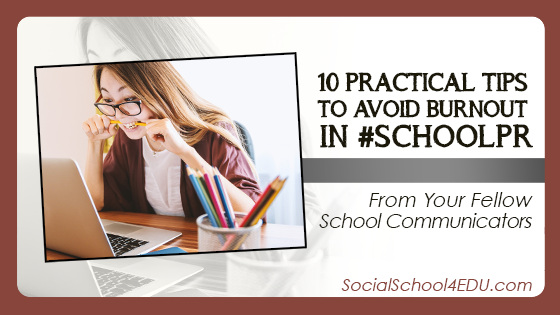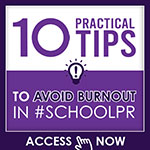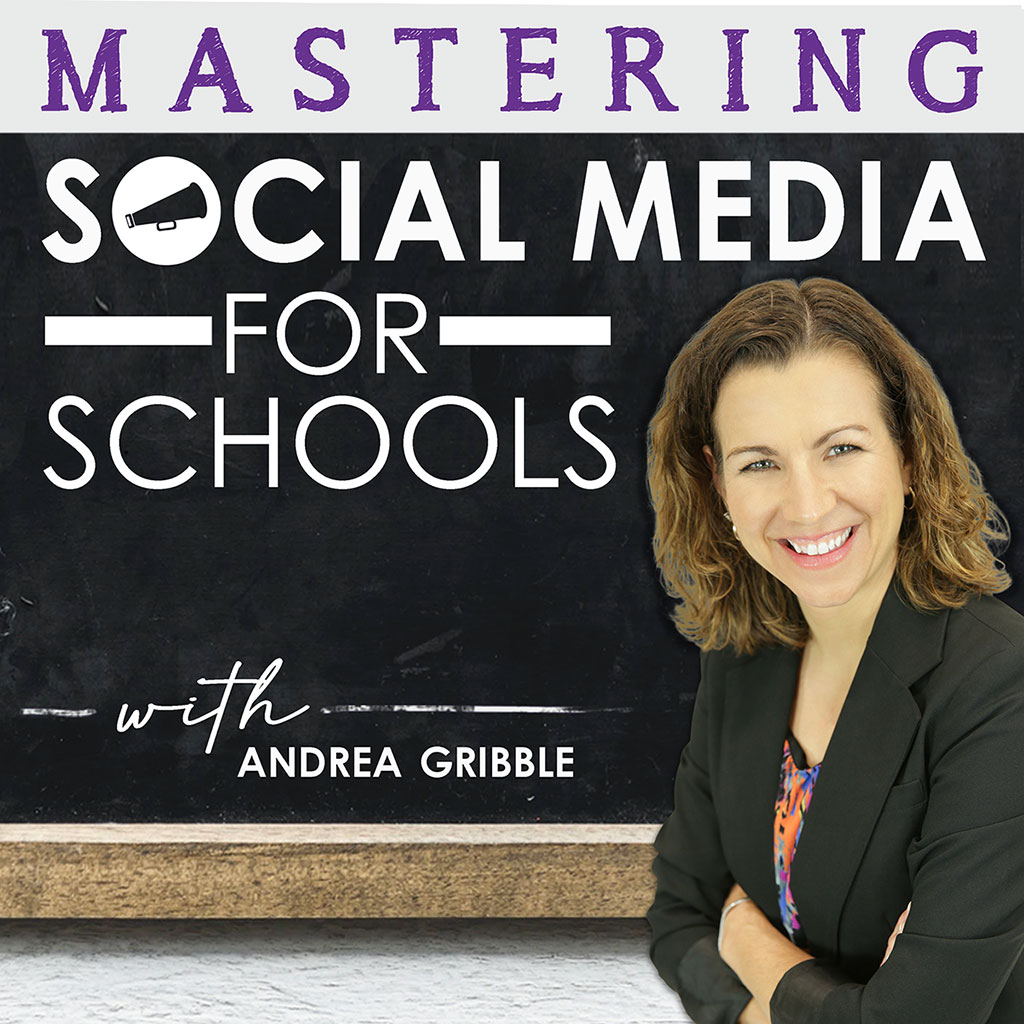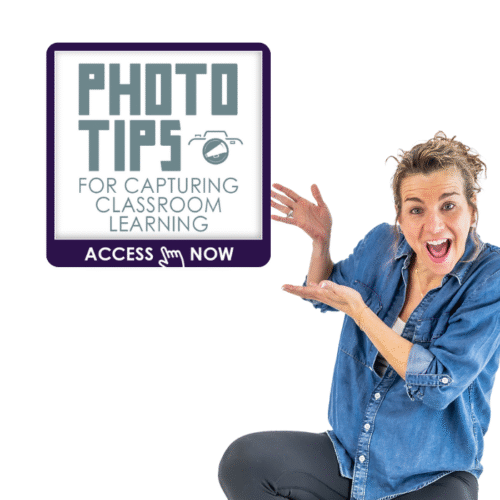As a school communicator, you fill an important role.
This role was deemed CRITICAL when schools closed their buildings last March. And it’s a role that continues to show its importance as we navigate through this school year.
But with the never-ending requirement for constant communication in these very uncertain times, stress and overwhelm is a daily reality.
So how do you build a rewarding career in school communications without sacrificing your personal life?
I don’t have all the answers, so I reached out to school communicators across North America for their best advice. You’ll see their advice boiled down into 10 simple tips, below, followed by their full advice in their own words. You can also download this shareable PDF with these 10 tips here!
This podcast episode with Kristin Magette, APR, will give you a quick wellness check-in.
A quick note: If you don’t take action, this list will not help you. For things to get better, you actually have to be willing to commit to at least a few of these ideas. My promise is that if you take action, you will experience a better work/life harmony. I don’t think “work/life balance” is the right word, but harmony is absolutely possible. It CAN get better.
 Set boundaries for your workday
Set boundaries for your workday
Only respond to emails and phone calls during your normal working hours. Yes, emergencies will happen. Your leadership team should be aware of how to reach you if something is truly an emergency… but that method should not be shared with everyone in your district.There will always be “one more thing” on your to-do list. To help you shut things off when you’re not working, create a list of priorities for the next workday – and leave that list at the office.
 Schedule communications in advance
Schedule communications in advance
The majority of social media posts do not need to be posted the moment the photo is taken. Use the scheduling features on social media to your advantage. You will reach more people if you utilize the four best posting times and limit (or eliminate) weekend posts.
Waiting on the results of a big sporting event? Get your AD and coaches involved by asking them to use the school hashtag on Twitter, so you don’t have to be responsible for tweeting every update in the moment.
Your email communications can also be scheduled in advance, so take advantage of that feature in your marketing software.
 Talk it out
Talk it out
Your role comes with a lot of stress and pressure. Find a trusted person to talk to, such as a trained counselor, your spouse, a good friend, or another school PR colleague. Take breaks in your day
Take breaks in your day
Fresh air and exercise should always be a priority. It’s amazing what a short, 10-minute walk can do to spark your creativity for your latest project!
 Not every request is urgent
Not every request is urgent
Establishing deadlines is critical to success in your role. It’s easy for you, as an overachiever, to assume everything is needed ASAP. But define clear deadlines with your colleagues so they have realistic expectations for your work. They may not even realize all of the responsibilities on your plate, so have an honest conversation about what you’re working on and how their request fits into your priorities.
 Have a backup
Have a backup
The myriad of things you are responsible for, in your district, should each have a trained back-up person. Taking time off is important – and you also need to be replaceable in case of an emergency. Posting on your schools’ social media while you are on vacation is not acceptable. Take a look at Kristin Magette’s story and I promise you’ll feel empowered to get this process started right away. Don’t take things personally
Don’t take things personally
Because you’re responsible for so much of the communication in your district, it’s very easy to take things personally when people have questions or choose to criticize the district. Remember that you are just the messenger. Do not take these comments and complaints as personal attacks.
 Empathy will get you everywhere
Empathy will get you everywhere
You work in school communications because you have empathy. Showcase that special trait in each interaction that you have – with staff, with students, with parents, with board members, and with the community.
Habit 5 in Stephen Covey’s “The 7 Habits of Highly Effective People” is “Seek First to Understand, Then to Be Understood.” This will get you far!
 Remember that your words matter
Remember that your words matter
When giving recognition in your public communications, it’s easy to just focus on your rockstar teaching staff. But remember that the words you use matter. There are just as many support staff and administrative positions that help your school achieve its mission. Make a conscious effort to use words that praise your entire staff.
And this should go without saying – do not ever bad-mouth others. This includes staff members, parents, community members, and members of the board. Everything comes back around. Hold yourself to a high professional standard.
 At home, put away your technology
At home, put away your technology
The physical act of putting your phone in a drawer or in another room will help you focus on your family and personal life. If you must have your phone or laptop with you in the evenings, let your family know that you’re working. It’s easy for kids to complain that “Mom is on her phone again” – but if you explain that it’s part of your job, and let them know that tonight you have to help respond to some questions, they’ll understand.
Still, refer back to #1! You don’t need to be “on” all the time.
Bookmark this blog or print off these tips and highlight the ones you are going to work on, this week. I know it’s not easy to change ingrained habits, but you absolutely need to have boundaries and standards in place. Your health and sanity need to be a priority. And if you ever need to talk, I’m here for you.
School Communicator Advice – In Their Own Words
Batch your social media.”
Natalie Eiting, Special Education Teacher & Social Media Manager
School District of South Milwaukee, WI
Make sure your team understands the distinction between urgent/important/neither. Only take “after hours” emails or calls if urgent.”
Ari Polsky, Independent Communications Consultant
https://aripolsky.com/, CA
The best tip I ever got was not to assume that every request you receive is urgent. It’s so easy to FEEL like people expect you to deliver everything right away, but I am often surprised by the results when I say something like, ‘I’m finishing up another project right now. Can I get that to you on XXX date?’”
Emily F. Popek, Public Information Specialist
Capital Region BOCES, NY
We set the high expectations on ourselves, no one else really puts those there – except in rare instances when a boss really does need something ASAP!”
Christy McGee, APR, Director of Communications
Fountain-Fort Carson School District 8, CO
One of my favorite podcasts, ‘The Lazy Genius Podcast,’ advises listeners to ‘Be a genius about the things that matter and lazy about the things that don’t.’ This applies to so many things in life, including school PR! I follow this advice to give myself permission to simplify the routine things – templates for social media or captions on Throwback Thursday posts, and focus on what really matters to do my job and do it well.”
Megan Anthony, Communications Coordinator
Clark County ESC, OH
I learned at the National School Public Relations Association that we often set our own arbitrary deadlines. If we set the deadline, we have more control than we think. Differentiate between hard deadlines and negotiable deadlines. I used to say there are only two dates you can’t move: the first day of school and graduation —- but even those dates were in flex this year.”
Janet Swiecichowski, APR, Vice President
CEL for Marketing, PR and Design, MN
Try to have ‘normal work hours’ as much as possible. Some things are out of our control, but I’m trying really hard to train stakeholders by only responding to emails, notifications, etc, during ‘normal work hours.’ My superintendent and other admin know how to reach me if it’s an emergency. On the flip side, I need to practice what I preach and only email colleagues, etc during ‘normal work hours.’ Thank goodness for the Gmail scheduling feature! I’ve also disabled quite a few sound notifications on my phone, which has helped with anxiety. I don’t need my phone to ping every time I get an email. Most importantly, I’m trying to be intentional about making time for connection – what gets scheduled gets done. Relationships are more important now than ever before and I need to make time for them, even if it’s just a phone call, or mailing a card.”
Joëlle Doye, Communications Director
Mineral Point School District, WI
Year 28 here. It took me a while to figure this out, probably because the work changed so drastically over that time period. I had to learn to set boundaries, almost like baby-proofing a room, to protect my mental health. I put bumpers on my day… I start the day with a walk, exercising in quiet as the sun rises, then sit on my living room floor doing a devotional, prayer and meditation (sounds loftier than it is… a lot of it’s just sitting quietly and relaxing my mind and body). Only after that, after I’ve gotten my mind in the right place, do I dare look at email and social media. At the end of the workday, I prioritize time with my family, doing things that bring me joy and relaxation – and unless it’s an emergency, I don’t check social media or email at least a good hour or two before bedtime. It’s a conscious, constant effort to prevent the work from creeping into my private life. I will confess that melatonin has become my friend in getting a good night’s sleep.”
Mickey Schoonover, APR, Director of School-Community Relations
Pattonville School District, MO
Taking a 10-minute walk in the middle of the day has been a lifesaver for me. Fresh air can bring a fresh perspective!”
Erica Schultz Chandler, APR, Director of Communications
Affton School District, MO
I put health and my family and my non-work priorities on my calendar, during the day, especially. Then, I set the expectation that I’m not really reachable after hours except in an emergency/urgent situation. And I set my phone in another room when I’m home.”
Christy McGee, APR, Director of Communications
Fountain-Fort Carson School District 8, CO
Make sure to get fresh air and exercise daily… or at least take a tech break… too much screen time is a killer!”
Emily C. Buckley, Director of Marketing & Communications
La Salle High School, OH
I say move your body. I feel so much better when I get my workout in before work. I think more clearly and I’m just a much nicer person.”
Marci Minor, Director of Communications
Mexico School District 59, MO
I’m in my 7th year of doing this. If I had advice to give, it would be:
1) Find someone you 100% trust and vent, share, laugh with this person. Truly, the stories we could tell could absolutely fill a book.
2) Recognize that nothing is personal. When people are angry, it’s not at you. It’s not even necessarily at the teacher, the principal, the superintendent, or the school board. Do we all make decisions that impact people? Of course. But so much of what happens is beyond our control and anger is often a result of a person’s personal situation outside of the school. You may represent the district at times, but your worth is far greater than that of a visible target.
3) Value every bit of time away and prioritize it. Have a plan in place to handle your things, including emergencies, communicate boundaries and expectations, and step away. Put your phone down. If a crisis happens in your absence, well, it probably would have happened even if you were there. You deserve a break.
4) Empathy will get you everywhere. Being in this role as a parent of students who attend my district gives me a great advantage in speaking with parents. Put yourself in that parent’s position and imagine their child is your child. Be as helpful as you’d expect if you were in the same situation.
5) Don’t ever badmouth any union, especially any union in your district.
6) Make a note to prioritize staff members who are not teachers or administrators. So often people in support roles feel forgotten and the exact language we use makes a huge difference. You do not have ‘caring teachers,’ you have a ‘caring staff composed of teachers, custodians, food service professionals, secretaries, paraprofessionals, nurses, social workers, counselors, bus drivers, school resource officers, interoffice mail carriers, and maintenance personnel.’ If you see any of these people out and about who you recognize, say hello, buy them their next beer, strike up a chat, learn more about them. As the district, highlight them any chance you get.
7) Never underestimate how much parents and guardians do, and always be gracious when they truly try. This includes moms, dads, grandmas, grandpas, aunts, uncles, cousins, older siblings, and neighbors. It takes a community of people and this community varies greatly from child to child.
8) Don’t use whatever email app you have. Get your email through an internet browser, so you see it when you want to see it. If someone needs to reach you urgently, they know how.
9) It’s easy to fall into the trap of nudging a finger toward a department or building that dropped the ball. To a parent, it’s all the same. If you’re responding, you represent every person at the district – there is no ‘them’ at your district.
10) Start every response to a parent with ‘Thank you for reaching out to us!’ If something terrible has happened to a student/parent/situation, don’t automatically apologize without understanding what happened. An automatic apology carries a sense of guilt when it was most often just a misunderstanding or lack of communication on the part of two people. Tell the person you’d like to learn more about what happened, then offer to help them to the best of your ability.
11) The worst thing we have to deal with is the death of a child. It will never get easier. Even if you don’t know the child, by the time you are talking about the child in a public way, you will feel like you know the child from speaking with staff who knew the child. So yes, it feels like you are grieving a child you have just gotten to know. It’s heartbreaking. See my #1 piece of advice.”
Brenda Kolbe, Director of Communication
Elkhart Community Schools, IN
Have a backup in place so you can take vacation time without (too many) interruptions. Also, In a seminar I attended once, we were taught that we aren’t emergency room doctors. The vast majority of what we do is not an immediate crisis. Slow down, think it through and do it well.”
Jenny Hartnett Thompson, Director of Marketing
Public Relations & Tourism, City of Rochelle, IL
I do my best to prioritize things like sleep and exercise – it feels selfish, but if I’m not taking care of myself, I’m not as effective at work. I turn my phone off when I’m at the gym, and have it on Do Not Disturb every night. I’ll also completely turn it off for scheduled breaks when I feel like I need it.
Take a lunch break!! Even if it’s just a short one. I often don’t feel like I can really leave the office for lunch – but I’ll lock my office door, turn off my computer monitors, and just enjoy a little quiet time. I usually feel rejuvenated and ready to get back to it afterward.
I agree with the comments about having someone to vent to, but also agree with keeping that group small. It’s okay to have moments, but I find that positivity begets positivity, so I try to keep my interactions with co-workers and community members positive, even if it’s joking about how crazy things are. Send thank-you notes. Random acts of kindness are huge mental health boosts.
Keep a well-stocked snack drawer with a good mix of healthy and unhealthy.Yes to the comments about not taking things personally.
If possible, get out into a school. I find that being in a classroom or chatting with a teacher during recess makes my day better.
If I find that I have to work in the evenings (even just to get through some emails so I start the next day in a better mindset), I’ll turn on a good movie or show and half-watch/half-work so it’s not as bad.
I try to schedule at least a few minutes every day where I can do something somewhat mindless (scheduling posts, throwing something together in Canva – even if it’s just practice) where I can listen to a fun podcast or some energetic music. It’s a good mental break.
Watch. the. cute. cat. videos. Remember that you’re not alone!!
Catherine Foster-Gruber, Communications Specialist
Mesa County Valley School District 51, CO
Make sure your kids know they are always number one and work is a priority so we can enjoy the life we have. There are so many instances that work takes me away from them – tucking them in at night, missed games, practices and lessons, distractions when I am home, but it reinforces that work ethic and giving 110% are critical to success both personally and professionally. I have told them since they were little – find the work you love to do and then do it every day. It’s not about the pay, it’s about work with a passion. And the people you work with are not your family. They don’t love you. Don’t seek their praise and attention. That’s the role for your kids/significant other.”
Laurie Uhlir, Director of Community Relations
Mayfield City School District, OH
Unpopular opinion: watch the alcohol. It’s easy to say a drink takes the edge off. Before you know it, you’re drinking a lot more because of the stress – every day! I’ve turned to reading novels in the evenings to relax and not depend on alcohol. Am I perfect? No, definitely not. But I’m working on not being dependent on it as much.”
Devra Ashby, Chief Communications Officer
Colorado Springs School District 11, CO
I think I heard this at an NSPRA conference…but it still resonates to this day: Acknowledge that there will always be items on your to-do list at the end of the day. Of course, you could stay an extra hour or two or work from home a few hours after dinner…but guess what? Tomorrow morning there will still be a to-do list. Prioritize what must get done and go home at the end of the day! Set the boundary and be present when you are away from work.
My other work-life balance tip is to remember… you are not your job or your career or your position. You’re a human…you deserve time away each day to be with family, friends or just to be you.
And you’re replaceable…you may think the place can’t run without you doing just one more thing… but it can. So go home.”
Marcia Kelley, School Information Officer
East Syracuse Minoa CSD, NY
Bring joy and practice gratitude. Our brains are wired to look for and prevent problems. We are reputation protectors; it’s what we do. That takes an incredible amount of energy. And there are so many challenges these days.
It takes intentionality to look for something to be grateful for each day. But, there is research in neuroscience to support journaling about positive moments (not too much, just a couple sentences will do). When you reflect and write down a positive experience, your brain experiences it twice! Shawn Achor calls it the Doubler Effect.”
Janet Swiecichowski, APR, Vice President
CEL for Marketing, PR and Design, MN
Run away for short breaks where you don’t have cell service. Taking three-day weekends is the best. You have to take care of you – no one else will.”
Casey Owens, Director of Communications
Ozark School District, MO
I have walked three miles a day, five days a week, for 38 years with a friend. The walking is good but the talking is better. Nowadays, every day is a new game with new rules. Flexibility is the keyword. I heard someone say that we are building the plane as we fly it.”
Gwen Keys Hitt, Director of Communications
Covington County School District, MS
Get away from technology, even for a day, and just be around the people you love and who ground you. Also, take all your vacation days and truly walk away.”
Stephanie Smith, APR, Director of Public Relations
Fort Osage R-1 School District, MO
The tip that you don’t think about until it happens to you:
Don’t forget to keep your personal accounts separate from your school one. Duh!
Seems obvious, but when you’re juggling 321 fire batons in the air you’re bound to miss one – and this was a BIG one. My first year serving as district social media coordinator, I posted a video of my youngest son singing Frozen’s “Into the Unknown” onto what I thought was my Instagram page. Within seconds, I started getting messages like this: ‘hey did you mean to post your kid singing ‘into the unknown’ on the school’s page?’If it weren’t for my quick-acting student interns who caught it, the video might have made its district debut for several minutes! Luckily, I don’t post intimate pictures or anything TOO personal, but LEARN from me. Do yourself a favor and download the Facebook Business app that connects you to the Instagram Business page where you can post simultaneously to both. Do. It. now.”
Emily Siemens, High School Teacher & Social Media Coordinator
Brownsboro ISD, TX
I know it can be difficult, but put down the phone and be present with your family – especially on the weekends. While I’m completely guilty of checking my email on the phone, I try really hard to keep it to times when my husband and kids aren’t around. Work will always be there, my family is always my first priority and they deserve my full attention. What they don’t realize is that spending time with them – even if it’s just watching a movie or playing a game – fills me up and helps put balance in my life.”
Betsy Fuller, Director, School/Community Relations
Lakota Local Schools, OH
One thing I don’t do is comment from my personal account in any group page on social media about work. Ever. I don’t want to be tagged or messaged or called on my own time about school issues. So I monitor and watch in these groups. If the information I read is important or repeated, we may react with official communication, if needed.”
Kimberly Snyder, Communications Specialist
Hempfield School District, PA




